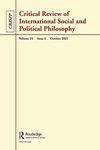政治自由主义与语言的形而上学
IF 0.9
Q3 POLITICAL SCIENCE
Critical Review of International Social and Political Philosophy
Pub Date : 2023-07-24
DOI:10.1080/13698230.2023.2239618
引用次数: 0
摘要
许多政治理论家认为,一个国家在语言问题上不可能是中立的。立法机构无法避免选择一种语言来开展业务,教师必须用一种语言教学生。然而,与此相反,一些政治自由主义者认为,自由主义的中立性与国家对特定语言的认可是一致的。他们说,与此相反的说法是基于对中立性的错误理解。我认为这一论点之所以失败,有两个原因。首先,政治自由主义者应该应对的主要挑战不是调和语言的推广与自由中立,而是调和自由中立与理性的人对语言的存在和性质存在分歧这一事实。其次,即使每个人都按照本质主义的路线接受了语言的存在,人们仍然应该怀疑国家对语言中立的可能性,无论人们更喜欢中立的概念。原因是人类不能关心或重视语言,所以当一个国家推广一种特定的语言时,它并不是在支持其公民的偏好,而是在完美主义或纯粹的非理性基础上行事。本文章由计算机程序翻译,如有差异,请以英文原文为准。
Political liberalism and the metaphysics of languages
Many political theorists believe that a state cannot be neutral when it comes to languages. Legislatures cannot avoid picking a language in which to conduct their business and teachers have to teach their pupils in a language. However, against that, some political liberals argue that liberal neutrality is consistent with the state endorsement of particular languages. Claims to the contrary, they say, are based on a misguided understanding of what neutrality is. I will argue that this line of argument fails, for two reasons. First, the primary challenge to which political liberals should respond is not that of reconciling the promotion of languages with liberal neutrality but, rather, that of reconciling liberal neutrality with the fact that reasonable people disagree about the existence and nature of languages. Second, even if everyone accepted the existence of languages along essentialist lines, one should still doubt the possibility of state neutrality with respect to them, regardless of the conception of neutrality one prefers. The reason why is that human beings cannot care about or value languages so when a state promotes a particular language, it is not supporting the preferences of its citizens but, rather, acting on perfectionist or simply irrational grounds.
求助全文
通过发布文献求助,成功后即可免费获取论文全文。
去求助
来源期刊

Critical Review of International Social and Political Philosophy
POLITICAL SCIENCE-
CiteScore
1.60
自引率
0.00%
发文量
74
 求助内容:
求助内容: 应助结果提醒方式:
应助结果提醒方式:


